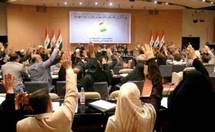
"They will start today, the real negotiations with other political blocs," Kamal al-Saidi, an MP from Maliki's State of Law coalition, told AFP.
Saidi said the National Alliance, the pan-Shiite grouping of which State of Law is the largest component, had formed a committee to consider which cabinet posts it wanted, and to hold talks with other parties.
Newly re-elected President Jalal Talabani was not expected to officially ask Maliki to form a cabinet until Thursday, a parliamentary official said, so as to give the incumbent prime minister more time to negotiate ministerial posts.
Under Iraq's constitution, Talabani has 15 days to appoint a prime minister following his selection by MPs on November 11. He had earlier been expected to name Maliki as premier on Sunday.
Once selected, Maliki would have 30 days to form a government.
"Jalal Talabani decided to nominate Maliki as prime minister on Thursday, one day before the official limit," the official told AFP, speaking on condition of anonymity.
"That is to give him the maximum amount of time to form the government, which is a very difficult task."
Meanwhile, lawmakers held just the fourth session of parliament since March elections and the first since the conclusion of the five-day Muslim holiday of Eid al-Adha, focusing on parliamentary rules and procedures, he added.
It comes after the power-sharing pact was agreed earlier this month and lauded by international leaders including US President Barack Obama, although the agreement has looked fragile ever since.
The deal called for Maliki, a Shiite, and Talabani, a Kurd, to keep their jobs and for a Sunni Arab to be selected speaker of parliament.
It also established a new statutory body to oversee security as a sop to ex-premier Iyad Allawi, who had held out for months to regain the top job after his Iraqiya bloc narrowly won the most seats in the March 7 poll.
The support of Iraqiya, which garnered most of its seats in Sunni areas, is widely seen as vital to preventing a resurgence of inter-confessional violence.
The Sunni Arab minority that dominated Saddam Hussein's regime was the bedrock of the anti-US insurgency after the 2003 invasion.
Illustrating the tenuousness of the accord, around 60 Iraqiya MPs walked out of a session of parliament on November 11, the day after the deal was signed, protesting that it was not being honoured.
The bloc's MPs had wanted three of its senior members, barred before the election for their alleged ties to Saddam's banned Baath party, to be reinstated immediately.
Two days later, however, Iraq's lawmakers appeared to have salvaged the deal after leaders from the country's three main parties met and agreed to reconcile and address the MPs' protests.
In a sign that security in the country remains precarious, two people were killed, including a seven-year-old boy, in separate bomb attacks in the restive central province of Diyala, the province's security operations command said.
----------------------------------------------------------------------------
Saidi said the National Alliance, the pan-Shiite grouping of which State of Law is the largest component, had formed a committee to consider which cabinet posts it wanted, and to hold talks with other parties.
Newly re-elected President Jalal Talabani was not expected to officially ask Maliki to form a cabinet until Thursday, a parliamentary official said, so as to give the incumbent prime minister more time to negotiate ministerial posts.
Under Iraq's constitution, Talabani has 15 days to appoint a prime minister following his selection by MPs on November 11. He had earlier been expected to name Maliki as premier on Sunday.
Once selected, Maliki would have 30 days to form a government.
"Jalal Talabani decided to nominate Maliki as prime minister on Thursday, one day before the official limit," the official told AFP, speaking on condition of anonymity.
"That is to give him the maximum amount of time to form the government, which is a very difficult task."
Meanwhile, lawmakers held just the fourth session of parliament since March elections and the first since the conclusion of the five-day Muslim holiday of Eid al-Adha, focusing on parliamentary rules and procedures, he added.
It comes after the power-sharing pact was agreed earlier this month and lauded by international leaders including US President Barack Obama, although the agreement has looked fragile ever since.
The deal called for Maliki, a Shiite, and Talabani, a Kurd, to keep their jobs and for a Sunni Arab to be selected speaker of parliament.
It also established a new statutory body to oversee security as a sop to ex-premier Iyad Allawi, who had held out for months to regain the top job after his Iraqiya bloc narrowly won the most seats in the March 7 poll.
The support of Iraqiya, which garnered most of its seats in Sunni areas, is widely seen as vital to preventing a resurgence of inter-confessional violence.
The Sunni Arab minority that dominated Saddam Hussein's regime was the bedrock of the anti-US insurgency after the 2003 invasion.
Illustrating the tenuousness of the accord, around 60 Iraqiya MPs walked out of a session of parliament on November 11, the day after the deal was signed, protesting that it was not being honoured.
The bloc's MPs had wanted three of its senior members, barred before the election for their alleged ties to Saddam's banned Baath party, to be reinstated immediately.
Two days later, however, Iraq's lawmakers appeared to have salvaged the deal after leaders from the country's three main parties met and agreed to reconcile and address the MPs' protests.
In a sign that security in the country remains precarious, two people were killed, including a seven-year-old boy, in separate bomb attacks in the restive central province of Diyala, the province's security operations command said.
----------------------------------------------------------------------------









 Home
Home Politics
Politics









